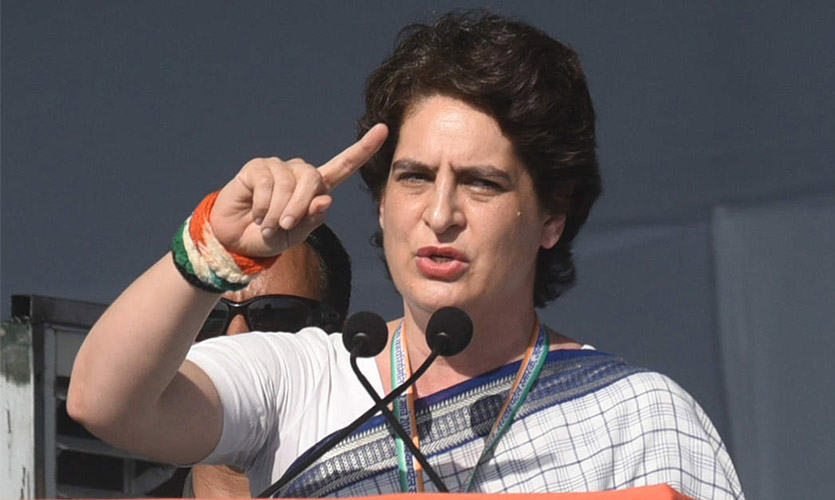Priyanka Gandhi Vadra, the All India Congress Committee general secretary in charge of Uttar Pradesh, arrived in Lucknow on Friday to kick off the party’s three-route Pradigya Yatra from Barabanki district on Saturday. The yatra will be launched from the grounds of Harakh Inter College in Zaidpur area of the district, and will conclude on November 1 in Bundelkhand. It will pass through Saharanpur, Mathura, Varanasi, and Raebareli.
Though this may not seem like a strong political ploy to win the upcoming assembly election in one of India’s most competitive states, recent events may shed some light on the desperate attempts made by the party to gain a foothold in UP. The unusually proactive Priyanka Gandhi Vadra has raised questions given that these events have occurred with the state election so close. These attempts ranged from sweeping the floors in Sitapur to meeting the families who have been wronged in some way, particularly by the UP government. It is natural to wonder what has made her notice the injustice, especially when the state has never been free of crime, violence, or even farmer deaths.
The AICC general secretary’s announcement of her party fielding 40 percent female candidates in the Uttar Pradesh election also has certain implications and possibilities. “I have taken this decision for women’s empowerment. There is no other political motive, agenda behind this decision,” she said. The fact that Priyanka Gandhi elaborated that women “may not consolidate as a separate voting bloc in this election, but they might in the next election or in the future” deserves closer scrutiny. Does it signify the empowerment of women? Is it a strategy to gain a share of the vote bank? Is this a way to unite and empower or create a divide on the basis of their gender? Is Uttar Pradesh the only place where women must be empowered, what about other BJP ruled states not due for election?
The UP Congress in-charge announced on Twitter that if her party wins in UP in the upcoming assembly election, it will provide women and girls with smartphones and electronic two-wheelers. She wrote, “I met some students, they said they need smartphones to study and for security. I am happy that with the consent of the manifesto committee, the UP Congress today took a decision to give smartphones to the girls who pass intermediate and electronic scooty to Bachelor students.” As she described, the move aims to empower every woman who believes in justice and unity, and counter attempts to divide them by caste and religion that keep them excluded. Will they not be concerned about women empowerment if their party does not win the election? Is it a viable strategy for mobilising women in a society plagued by patriarchy, caste, violence, and institutional failure?
Read more: 2022 Uttar Pradesh Assembly Election: Contesting Parties In The Fray
Breaking free from the shackles of caste-based politics may surely offer new political and social opportunities. However, while a quota will increase political participation, it will not necessarily create lively constituencies of women demanding more political and social autonomy. As we have seen in the case of caste, identity-based constituencies are pulled into serving limited political and electoral objectives rather than a socially transformational agenda. It is therefore, more important than ever to reiterate how women can empower themselves through electoral power.
In order for Priyanka Gandhi’s idea of women’s empowerment to have a lasting impact, she must go beyond a captive gender-based vote bank. In the end, women’s empowerment that does not address the everyday social and personal conflicts women face will only end up being looked at as an election strategy.










